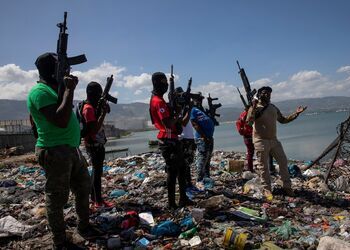Haiti’s gangs finally easing their grip on a blockade of the country’s fuel supply may only be temporary, serving to underscore yet again the levels of criminal governance these groups have amassed.
The country’s largest oil terminal country, Terminal Varreux, has been able to resume delivering fuel for the first time in almost a month. On November 12, about 70 trucks lined up to load gasoline, which has been desperately needed to keep emergency services, healthcare and power running in Haiti.
The easing of the blockade follows the announcement of a truce made between the gang alliance, G9 an fanmi (G9 and family), and the local government in Cité Soleil, a district of the capital Port-au-Prince.
The details of concessions made to the gangs have not been released publicly, but leader Jimmy Chérizier, alias “Barbecue,” had previously demanded the withdrawal of state forces from the area and the resignation of Prime Minister Ariel Henry.
SEE ALSO: Fuel, Water, International Aid: Haiti’s Gangs Weaponize Essential Services
The negotiated end to the blockade comes after failed government attempts to reopen the facility, including a security corridor to protect fuel trucks from ambushes.
The blockade of Terminal Varreux was part of a coordinated effort by criminal groups to restrict access to fuel across Haiti in order to destabilize the government. The subsequent crisis proved life-threatening, as Haiti’s dysfunctional electricity grid relies on fuel generators to supplement the supply of electricity.
In a press conference on the day the facility reopened, Chérizier stressed that blockades would resume if Prime Minister Henry did not resign. The deal only extends until November 18.
InSight Crime Analysis
Despite being a welcome respite from a deadly shortage, the resumption of fuel deliveries orchestrated by Chérizier is a demonstration of his power in Haiti and could feed into his broader political ambitions.
In the aftermath of the assassination of President Jovenel Moïse, Chérizier began presenting himself and his men as part of a revolutionary movement, upholding the memory of the slain president against his enemies.
The blockades are an effective political tool in this respect, bending the will of Haiti’s government. Chérizier has repeatedly demanded the resignation of Ariel Henry. Though that demand goes unmet, the blockades earn him comfortable payoffs.
SEE ALSO: Profile of G9 and Family
Haiti has seen repeated truces of this kind to several different gang-enforced blockades. None of them have signaled a shift away from the tactic of holding essential services hostage.
Following the devastating August 14 earthquake, Haiti’s gangs erected a blockade in Martissant that halted the supply of humanitarian aid – even using snipers to stop aid organizations. A similar agreement ended that blockade but did not prevent gangs from returning to the same tactic in the ongoing fuel crisis.
Terminal Varreux has also seen blockades eased and then returned, including several months ago when Chérizier allowed the terminal to reopen following negotiations with the government. The details of the deal were unclear, but the gang had demanded $100,000.

